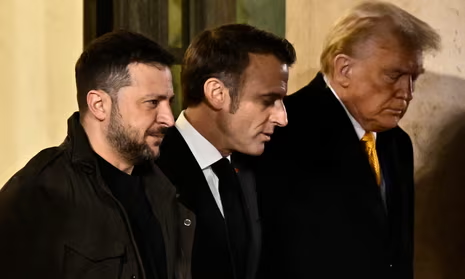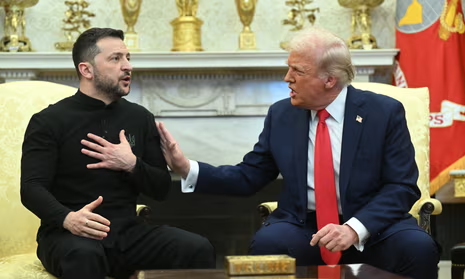
In a surprising and bold move, Ukrainian President Volodymyr Zelenskyy has proposed a trilateral meeting with former U.S. President Donald Trump and Russian President Vladimir Putin. Zelenskyy’s statement, “I don’t mind, I am ready,” underscores his willingness to engage in direct dialogue to address pressing geopolitical tensions. This call for a three-way discussion comes at a time when the world is closely watching Ukraine’s ongoing conflict with Russia and the evolving dynamics of international diplomacy.
A Diplomatic Gamble Amid Global Tensions
The proposal for a trilateral meeting is nothing short of a diplomatic gamble, showcasing Zelenskyy’s commitment to finding innovative solutions in a polarized world. As Ukraine continues to resist Russian aggression, the stakes for peace remain incredibly high. The conflict, which has drawn widespread condemnation of Moscow’s actions, has also led to significant geopolitical realignments.
Zelenskyy’s readiness to engage Trump and Putin signals his recognition of the importance of involving influential global leaders. Trump, despite his controversial tenure, maintains a significant following and continues to wield influence within U.S. political circles. Putin, as the architect of Russia’s military strategy in Ukraine, remains a central figure in any potential resolution. By proposing this meeting, Zelenskyy is navigating the fine line between assertive diplomacy and the pragmatism required to address the conflict’s complexities.
Historical Context: A Conflict That Redefined Europe
The roots of the Ukraine-Russia conflict trace back to 2014 when Russia annexed Crimea, sparking international outrage. Since then, the conflict has evolved into a full-scale war, with the Russian invasion of Ukraine in 2022 marking a grim chapter in modern European history. The invasion prompted unprecedented sanctions against Russia and galvanized NATO’s unity.
For Zelenskyy, who rose to power as a political outsider and former comedian, the war has tested his leadership like never before. His defiance and rallying cries for international support have earned him widespread admiration. Yet, the toll of the conflict on Ukraine’s economy, infrastructure, and citizens has been staggering. In this context, Zelenskyy’s proposal for a trilateral dialogue reflects his determination to explore every avenue for peace, even if it means engaging adversaries.
The Trump Factor: A Polarizing Presence in Global Affairs
Including Donald Trump in the proposed meeting adds an intriguing layer to the diplomatic equation. Trump’s presidency was marked by an unconventional approach to international relations, often prioritizing personal rapport over established norms. His perceived closeness to Putin and controversial withholding of military aid to Ukraine during his tenure raised eyebrows globally.
Now, as Trump positions himself for a potential political comeback, his role in Zelenskyy’s proposed dialogue could carry significant implications. While critics question Trump’s ability to contribute constructively, his involvement might serve as a bridge between divergent U.S. and Russian perspectives. For Zelenskyy, Trump’s participation represents a calculated risk aimed at leveraging his unique influence.
Subheading: Putin’s Calculus and the Kremlin’s Perspective
From Moscow’s standpoint, Zelenskyy’s proposal presents both opportunities and challenges. Putin’s government has consistently framed the conflict as a defense of Russian interests and cultural ties in eastern Ukraine. The Kremlin’s narrative of NATO expansionism and Western interference has found resonance among certain domestic and international audiences.
However, the realities on the ground tell a different story. Russia’s military setbacks and mounting casualties have strained its resources and public support. International sanctions have further isolated Moscow economically and politically. Amid these pressures, a high-profile meeting with Trump and Zelenskyy could offer Putin a chance to project strength and negotiate from a position of perceived parity.
A Potential Turning Point or Another Deadlock?
Despite the high stakes, the success of a three-way meeting hinges on numerous variables. Chief among them is the willingness of all parties to engage in meaningful dialogue. Trump’s unpredictable demeanor and Putin’s steadfast refusal to admit fault could complicate negotiations. Furthermore, Zelenskyy must balance his desire for peace with the need to maintain the trust of his Western allies, who have been instrumental in supporting Ukraine’s resistance.
Subheading: The Role of International Observers and Stakeholders
A trilateral dialogue of this magnitude would undoubtedly draw the attention of international observers and stakeholders. Organizations like the United Nations and the European Union could play critical roles in facilitating discussions and ensuring accountability. Similarly, NATO’s involvement might be necessary to uphold the security guarantees that Ukraine seeks.
The global community’s response to Zelenskyy’s proposal will also shape the meeting’s trajectory. While some nations might view it as a pragmatic step toward de-escalation, others could perceive it as legitimizing Russia’s actions. Striking a balance between these perspectives will be crucial for the proposal’s viability.
Subheading: Media and Public Opinion’s Influence
Public opinion and media narratives will inevitably influence the outcome of Zelenskyy’s proposal. In Ukraine, where resilience against Russian aggression remains a source of national pride, reactions to engaging Putin in dialogue may be mixed. Zelenskyy’s ability to frame the meeting as a necessary step toward safeguarding Ukraine’s sovereignty will be key to garnering domestic support.
Globally, the media’s portrayal of the proposed dialogue will shape perceptions of its legitimacy and potential impact. By emphasizing the humanitarian and geopolitical stakes, Zelenskyy can appeal to a broader audience and strengthen the case for negotiations.
Subheading: The Broader Implications for Global Diplomacy
Zelenskyy’s proposal is not merely about resolving the Ukraine-Russia conflict; it also reflects a broader need for recalibrating global diplomacy. The 21st century has witnessed an erosion of multilateral frameworks, with major powers increasingly pursuing unilateral policies. The trilateral meeting could serve as a test case for revitalizing dialogue-based conflict resolution.
Moreover, the outcome of such a meeting would resonate far beyond Ukraine. It could set a precedent for addressing other protracted conflicts, from the Korean Peninsula to the Middle East. By championing diplomacy, Zelenskyy is positioning Ukraine as a pivotal player in reshaping the global order.
Subheading: Challenges in Bridging Ideological Divides
The ideological differences between the parties involved cannot be overlooked. Zelenskyy’s vision of a democratic and sovereign Ukraine stands in stark contrast to Putin’s expansionist ambitions. Trump’s America First approach adds another layer of complexity, as it often prioritizes U.S. interests over collective security arrangements.
Finding common ground among these divergent perspectives will be a herculean task. It will require not only skilled negotiation but also a willingness to compromise on deeply held positions. Whether such compromise is achievable remains an open question.
Subheading: The Humanitarian Imperative
At its core, Zelenskyy’s proposal is driven by a humanitarian imperative. The war in Ukraine has caused immense suffering, with millions displaced and thousands of lives lost. Rebuilding the nation’s shattered infrastructure and addressing the needs of war-affected communities will require significant international support.
By advocating for dialogue, Zelenskyy is signaling his commitment to alleviating the human toll of the conflict. This focus on humanitarian concerns could serve as a unifying factor, compelling even skeptics to support the proposed meeting.
Conclusion: The High Stakes of Diplomacy
As Zelenskyy pushes for a three-way meeting with Trump and Putin, the world watches with a mix of anticipation and skepticism. This bold proposal reflects his commitment to exhausting every avenue for peace, even in the face of daunting challenges. While the road to resolution remains fraught with obstacles, the potential rewards of a successful dialogue—stability, reconciliation, and the prevention of further bloodshed—are too significant to ignore.
Whether this initiative marks a turning point in the Ukraine-Russia conflict or becomes another missed opportunity, Zelenskyy’s willingness to embrace unconventional diplomacy stands as a testament to his leadership in one of the most tumultuous periods of modern history.

